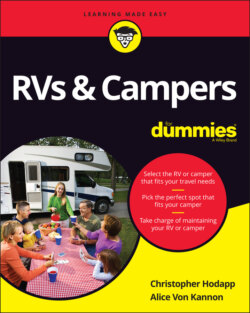Читать книгу RVs & Campers For Dummies - Christopher Hodapp - Страница 15
Full-timers
ОглавлениеThe number of RV owners who choose to live on the road 365 days a year is growing dramatically. According to the RV Industry Association (RVIA), 450,000 people were living in RVs in 2010; as of 2021, that figure is over a million. RV manufacturers have responded by offering models with as much living space as possible, using slide-outs that expand when you’re parked. More and more rigs are equipped with residential-grade appliances like refrigerators, dishwashers, and washer/dryer units — items that would have only been found in the most expensive units until recently. The largest fifth-wheel trailers and motorhomes feel more like a house than an RV.
On the other hand are “minimalist” full-timers in vans and Class Bs, with variations in between. Our parents once wisely cautioned us against being owned by our possessions. Singles and empty-nesters alike can feel overwhelmed by the costs, daily care, and maintenance of a house. Yet, a 25- to 40-foot-long home on wheels can be kept neat and orderly with a minimum of effort and expense. It can be incredibly liberating.
Living perpetually on the road is a big commitment to change. It comes with its own challenges, and much of that stems from the problem of establishing a legal domicile (a permanent mailing address for everything from health insurance to filing taxes and voting). RV-friendly states like Florida, South Dakota, and Texas make it simpler to establish a legal domicile, but in most cases, you have to visit your home base at least once a year to stay legal.
Escapees RV Club (www.escapees.com) is a major provider of services for full-timers, like mail forwarding and roadside assistance. Their Xcapers group within the club is geared to helping full-timers. They even have their own annual gathering each year, called Convergence.
